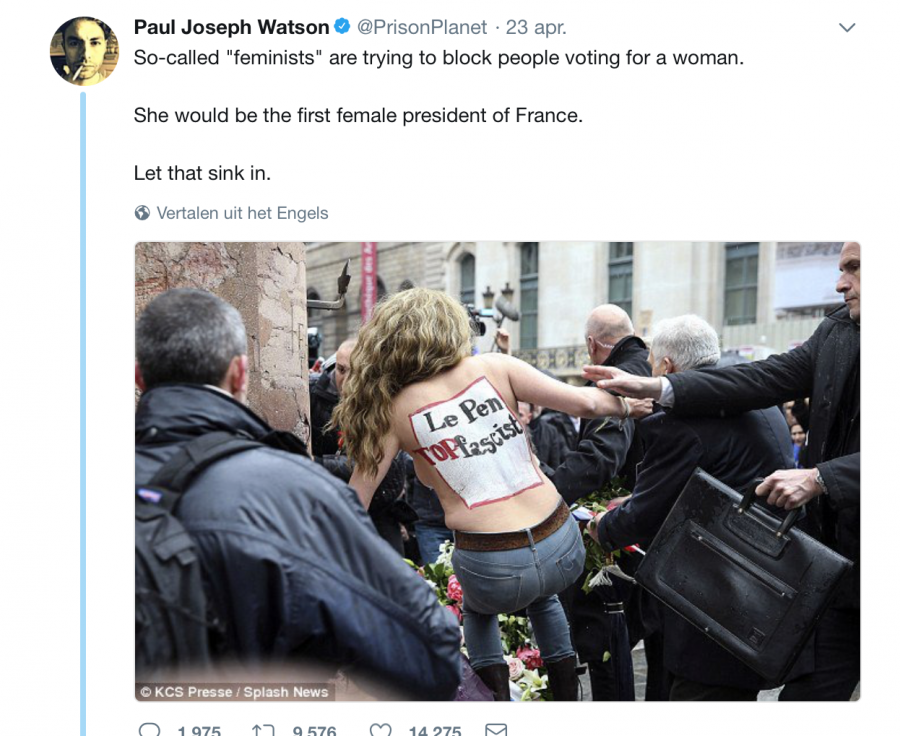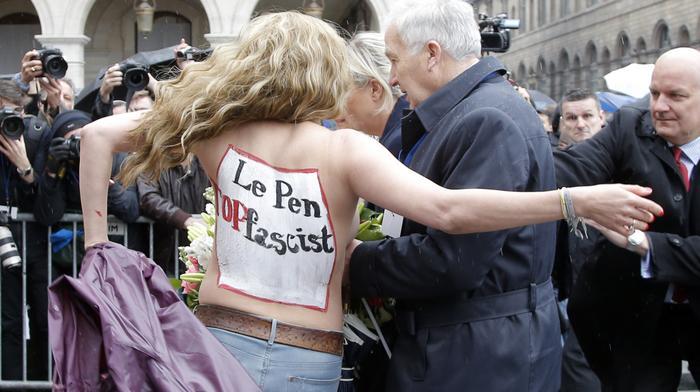
Marine le Pen: a fake feminist?
When Marine Le Pen took over the leadership of Front National from her father in 2011, she decided to take the French party into a new direction. The party was known for belonging to the extreme right: they fiercely opposed European immigration, strived for economic protectionism and several members of the party were accused of marginalizing the Holocaust. Marine Le Pen has been trying to distance the party away from the radical image it once had (Chira, 2017).
Despite her efforts to 'de-radicalize' the Front National, Marine Le Pen and her party have faced a great amount of criticism and resistance. An interesting force of protest against Le Pen is the feminist movement FEMEN. This group of women oppose one way in which Le Pen has been detoxifying the party: by positioning herself as a feminist.
In this article, I will analyze the ways in which Le Pen has been using her feminine side for her political goals and what these goals are exactly. In order to do this, a campaign video and speeches will be analysed. We will also look more closely at what it is FEMEN is resisting and in what ways they are protesting Le Pen. Lastly, the friction between these two parties will be analyzed by using the concept of the discursive battle of meaning (Maly, 2016).
Marine Le Pen and feminism
As has already been stated above, Marine Le Pen has been trying to 'de-radicalize' Front National by constructing a different image for the party. ‘Image is not necessarily visual; it is an abstract portrait of identity fashioned out of cumulating pattern of congruence across all manner of indexical signs including visuals that addressees and audiences can imaginatively experience, like a hologram.’ (Silverstein, 2003, as quoted in Maly, 2016). As a politician, you carefully organize and construct this: ‘it may be consistent within an event, or over a series of them, or even across a whole biography.’ (Silverstein, 2003, as quoted in Maly, 2016). The image that Le Pen created of herself in her campaign is that she is a strong-minded and well-educated woman, who has been successful in politics.
This image has been consistently constructed by Le Pen and her team in the media. In an official campaign video, we can see this very clearly. She says: “I am a woman … I am a mother … I am a lawyer” (Le Pen, 2017). Le Pen is waving the women's flag and is also positioning herself as highly educated. These indexical signs point towards someone strong, professional and hard-working, but above all to someone who is a woman.
Campaign poster Marine Le Pen
Marine Le Pen has thus been intentionally directing more attention towards her femininity, which we also see on the poster, pictured above. While she normally wears pantsuits, she (most likely, deliberately) wears a skirt for this photo, in which a part of her leg is also visible. Her position, and the way she is holding her hands, are indexes of being more professional and hard-working, while the gentle smile makes her come across as more approachable.
The image that Marine Le Pen has created is that of a modern, diligent woman who does politics. She is constantly trying to show that she can be a great political leader. The highlighting of her feminine side is used to distance herself and her party from the old macho image the party had when her father was in control. Le Pen is not only highlighting this feminine side, she is also claiming to fight for equality between men and women. The form of feminism that she is promoting, is about the idea that women should work hard and stand up for themselves in a world that is dominated by men. Especially in French politics, it is very difficult to be successful as a woman; it is still very much a male-dominated business (Chira, 2017).
FEMEN’s protest
It is this claim 'to be feminist', that is among other issues one of the targets of FEMEN's protests. FEMEN positions itself as an international feminist movement “that carries out aggressive awareness-raising and information campaign in the Internet.” ("About us", n.d.). FEMEN is best known for its topless protests. This form of protesting has been chosen by the organization for its symbolic value of being in complete control of one's own body. Their ultimate goal is ‘complete victory over patriarchy’ (“About us”, n.d.).
FEMEN has heavily criticized and has protested against the image that Le Pen has created of herself. The movement has labelled the French politician a fake feminist. In February, they disrupted one of Le Pen’s speeches whilst shouting “Feminist fictive” (= fake feminist) (Franceinfo, 2017). On May Day, various activists disrupted a speech by Le Pen, with the texts “Heil Le Pen” and “Stop fascism” written on their topless bodies (Lajka, 2015).
FEMEN activist protesting against Marine Le Pen
The movement is not only protesting offline, but is also active online. In March, Inna Shevchenko, the leader of FEMEN, wrote an article in which she accused Marine Le Pen of false feminism. She wrote that Le Pen “disguises her xenophobia as a fake advocacy for women’s rights” and that “Le Pen is an anti-woman candidate as her political agenda is built on sexist, discriminatory policies which threaten abortion rights and funding for family planning centers” (Shevchenko, 2017).
These quotes capture the essence of FEMEN’s criticism. FEMEN activists are claiming that Le Pen is not pro-(equality for) women, but that she is using feminism to hide her anti-Muslim and anti-immigration agenda. In her article, Shevchenko points towards the first time Le Pen publicly defended women’s rights, which took place after the New Year’s Eve sexual assaults in Cologne. She saw this as an opportunity to blame migrants for problems in Europe: “Marine Le Pen preaches anti-migrant, anti-Muslim and xenophobic sentiments, claiming she is the one to protect French women from an Islamist onslaught.”. FEMEN is thus labelling Marine Le Pen’s image of being pro-women as fake.
Different kinds of feminism
We can analyse the conflict between these two sides by using the concept of the discursive battle of meaning. In order to understand this we also need to take a look at intertextuality. “Whenever we speak, we speak with the words of others. Language always comes as ‘a structure of givens’ (Foucault 1972: 98). That means that every utterance has a history of use and abuse” (Maly, 2016). Language, and especially in politics is never made up, but is always connected to a certain historical tradition. The discursive battle is thus about people attaching different meanings to words as they use them connected to different discourses.
Marine Le Pen and the FEMEN activists have a different take on what feminism is about. FEMEN, as a movement, consists of a strange mixture of old femnist discourse and the incorporation of certain tpost-feminist elements. The classic feminist discourse about equality and the destruction of the patriachy, is connected to an 'intersectional' approach when they deconstruct the feminism of Le Pen as nothing more than racism and fascism, which is specifically targeting Muslims.
The concrete form of FEMEN activism; the fact that only beautiful women protest topless can be seen as an example of post-feminism. They thus use their nakedness as a form of protest and see this as the “new aesthetics of women’s revolution”. Gill (2007) writes that within post-feminist media culture 'obsessional preoccupation with the body' is an important aspect: The sexualization of the woman's body can be seen as an internalization of unequal power relations; of the patriarchy. FEMEN claims that the body is a woman’s source of power and identity and emphasises the importance of women being in control over their own bodies, as they believe that in today’s society a woman is “stripped of ownership of her own body” (“about us”, n.d.).
FEMEN uses and approriates contemporary 'post-feminist' logic and uses it to question Le Pen. Both claim to be the real embodiment of feminism. However, whereas we see that FEMEN indeed has feminist demands, we see that the equality between men and women in Le Pen's discourse is only mobilized to exclude Muslims.
The kind of feminism that Le Pen has been promoting is not so much about equality between men and women and releasing women from forms of suppression. Le Pen’s feminism manifests itself only in connection to anti-immigration and anti-Islam discourse. She uses it to position Muslims and other immigrants as dangers to society. They threaten 'the Western culture', in which women and men are treated equally. Le Pen, in this respect, is a classic example of what Gill (2007) calls post-feminism: the idea that feminism has realized its battle.
Who is the real feminist?
The idea that Marine Le Pen is a feminist and thus a positive influence on the furthering of women's rights is not commonly accepted, but part of an ongoing discursive battle of meaning..
Various alt-right twitter users believe that if you are truly a feminist, you should want Marine Le Pen to become president, since she would be the first female president of France (Valens, 2017). Paul Joseph Watson, editor of Infowars (a ‘news’ website owned by conspiracy theorist Alexander Jones), tweeted about a FEMEN protest, calling the activists “so-called ‘feminists’” who “are trying to block people for voting for a woman” (Valens, 2017). Later on, he also called out feminist Christina Hoff Sommer for not supporting the possible first female president of France. Watson, and various other users that agreed with him; they believe that you cannot call yourself a feminist if you do not support Marine Le Pen. They are thus pointing at a supposed hypocrisy in FEMEN’s appropriation of feminism: they stand up for women and their rights, but do not support a female politician.

Many journalists, prominent feminists and politicians accuse Marine Le Pen of ‘fake feminism’, thereby agreeing with FEMEN’s stance on the matter. Valerie Precresse, who was a budget minister in former French President Sarkozy’s government, stated that Le Pen's new, softer image of both herself and her party is not about feminism, but about nepotism (Chira, 2017).
Precresse is not the only one questioning the authenticity of Le Pen’s feminism. In April, Laurence Rossignol (2017), a French politician who served as the Minister of Families, Children and Women’s Rights, wrote a blog about how she will not support Front National. She claims that women's rights are in danger if Le Pen were to be elected as president. Rossignol writes that the rights won by women are “fragile” at the moment and that Le Pen would not be able to protect them. She also mentions the mobilisation of feminists as a necessary thing, but this alone is not enough to fight the threat. According to her, they need the government to back them up and Emmanuel Macron would be the right person to do this. Although Rossignol does not mention FEMEN specifically and this piece can also be seen as a propaganda strategy for Macron, she believes resistance against Le Pen organised by feminists is necessary.Rossignol isn't alone in her support of feminist activists like FEMEN. The article is signed by many public figures: French politicians, writers, journalists and presidents of various organisations that protect women’s rights. We can therefore say that FEMEN’s criticism on Le Pen’s appropriation of feminism is more widely accepted and supported.
If we would have to appoint a winner for the discursive battle, it would be FEMEN. Their protesting Le Pen and her feminism is more widely accepted and supported by public figures. However, we should remember that in politics language and message always need to be seen in relation to a certain discourse. Therefore, words can have different meanings to different people. In essence, this makes the discursive battle to define feminism and to appropriate it an endless one.
References
About Us. (n.d.). Retrieved December 13, 2017, from
Chira, S. (2017, May 04). Marine Le Pen’s Canny Use of Gender in Her Campaign. Retrieved December 13, 2017.
Franceinfo. (2017, February 23). VIDEO. "Marine, féministe fictive !" Une Femen aux seins nus interrompt un discours de Marine Le Pen. Retrieved December 13, 2017, f
Gill, R. (2007). Postfeminist media culture: Elements of a sensibility. European Journal of Cultural Studies, 10(2), 147-166. doi:10.1177/1367549407075898
Lajka, A. (2015, May 01). Video Shows Topless Femen Activists Disrupting Marine Le Pen's May Day Speech in Paris. Retrieved December 13, 2017.
Le Pen, M. (2017, February 05). Official campaign video | Marine 2017. Retrieved December 13, 2017, from
Maly, I. (2016). ‘Scientific’ nationalism. Nations and Nationalism, 22(2), 266-286. doi:10.1111/nana.12144
Rossignol, L. (2017, April 27). BLOG - Féministes, nous ne voulons pas du Front national. Nous votons Emmanuel Macron ! Retrieved December 14, 2017,
Shevchenko, I. (2017, March 10). Marine Le Pen is a Fake Feminist. Retrieved December 13, 2017.
Valens, A. (2017, July 25). Twitter's alt-right wants feminists to vote for Marine Le Pen because she's a woman. Retrieved December 14, 2017,.

